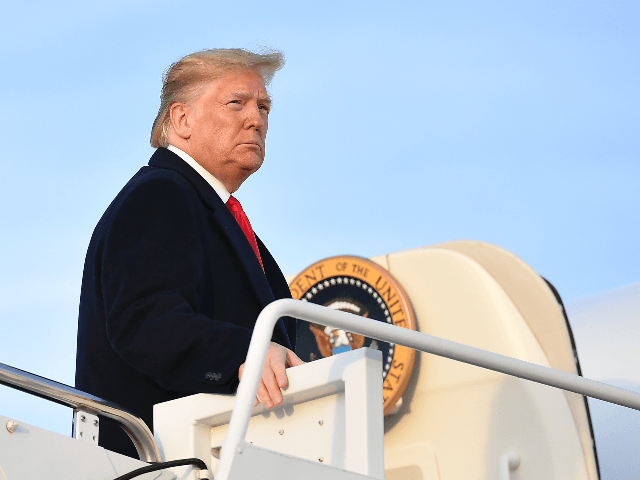President Donald Trump announced in a Monday Federal Registry statement that the federal government could no longer use taxpayers’ dollars for “educational and cultural exchange programs” partnered with the governments of Cuba, Russia, Syria, and North Korea.
The decree, handed down in a formal “Presidential Determination,” is a response to these countries’ egregious human trafficking abuses, or negligence in prosecuting criminals trafficking people in their country. The State Department has designated all four countries “Tier 3” countries for significant risk of human trafficking crimes, which allows the president to unilaterally restrict non-humanitarian aid at his discretion.
President Trump’s announcement limits funding through 2020, or until the governments on the list prove they have cracked down on human trafficking.
“I determine that the United States will not provide nonhumanitarian, nontrade-related assistance to, or allow funding for participation in educational and cultural exchange programs by officials or employees of, the Governments of Cuba, the Democratic People’s Republic of Korea (DPRK), Russia, and Syria for FY 2020,” President Trump wrote.
That ban could cease to be in effect if the governments listed “bring themselves into compliance with the minimum standards” on fighting human trafficking.
The decree also ordered “United States Executive Director of each multilateral development bank … and of the International Monetary Fund to vote against and use best efforts to deny any loan or other utilization of the funds” to the four previously stated governments and China, Iran, and several other states. Trump wrote the ban does not apply to money intended for “humanitarian assistance; for trade-related assistance; or for development assistance that directly addresses basic human needs,” assuming that money is not “administered by the government” and “confers no benefit to that government.”
“Cultural exchange” is one of the many exceptions to the increasingly porous “embargo” allegedly in place against the communist Cuban regime. Its existence allows for travel by well-connected, pro-communist Cuban acts into the United States to perform. The significantly stricter Cuban embargo on the United States allows no such travel for Cuban-American artists who publicly support their government or oppose communism.
The result has been a growing flood of non-Cuban American celebrities into Havana – Katy Perry, Kanye West, and Madonna – and the bizarre phenomenon of pro-Castro Cuban artists like Gente de Zona and Descemer Bueno frequenting Miami, but a complete lack of interaction between Cuban audiences and Cuban exile stars, many of whom refuse to visit the island until it is free.
The “cultural exchange” program that allows pro-Castro Cuban artists into the United States has caused tensions in Florida, home to the nation’s largest Cuban-American population. In June, the city of Hialeah, a largely Cuban working-class community, canceled the appearances of several pro-Castro artists in its July 4 celebration after former political prisoners and human rights activists protested.
“I have always said that my true heroes are the political prisoners who did suffer and have sacrificed everything for the cause,” Mayor Carlos Hernández said in a press statement at the time. “Even the most minimal suggestion from them is enough to make any kind of change.”
In September, Cuban American host Alexander Otaola announced a campaign to rescind the work visas of Gente de Zona, a pop music outfit that has performed for members of the Castro family, noting that similar Cuban-American pop acts would not similarly be granted visas to Cuba.
President Trump’s decree only bans the use of federal money for “cultural exchanges,” leaving open the possibility that local and state governments will use taxpayers’ money to book pro-communist performers.
The Cuban communist regime reacted with the usual outrage at Trump’s move. Granma, the official newspaper of the Communist Party, published the news with a doctored photo of Trump on the poster of the Netflix series House of Cards.

Granma described the measure as “part of the growing wave of aggression by Donald Trump’s administration against Cuba.”
Unlike other nations on the list, Cuba not only neglects to adequately prosecute human traffickers, but the state itself participates in a form of human trafficking: the “slave doctor” system. Cuba makes an estimated $11 billion a year forcing its doctors to travel to underdeveloped nations and work in unsafe conditions without receiving a working salary. As many as 100,000 doctors are forced to work in dangerous areas of rural Brazil, Kenya, and Pacific Island states. Doctors have faced jihadist attacks in Africa and, survivors have revealed, been forced to fabricate medical statistics to make the program appear more productive than it actually is.
Cuban dissident groups have offered evidence that the Cuban doctors cannot escape the system if they wished to return home.
“As in the case of forced prostitution, professionals were being retained their passports after passing customs, impeded from legalizing their university degrees and experience, prohibited of speaking with ‘native’ population, denied social or sentimental relationships, or kept crowded living in degrading conditions, and forced away from their families, threatened every day,” the Patriotic Union of Cuba (UNPACU), the island’s largest dissident group, asserted in a report in January.

COMMENTS
Please let us know if you're having issues with commenting.